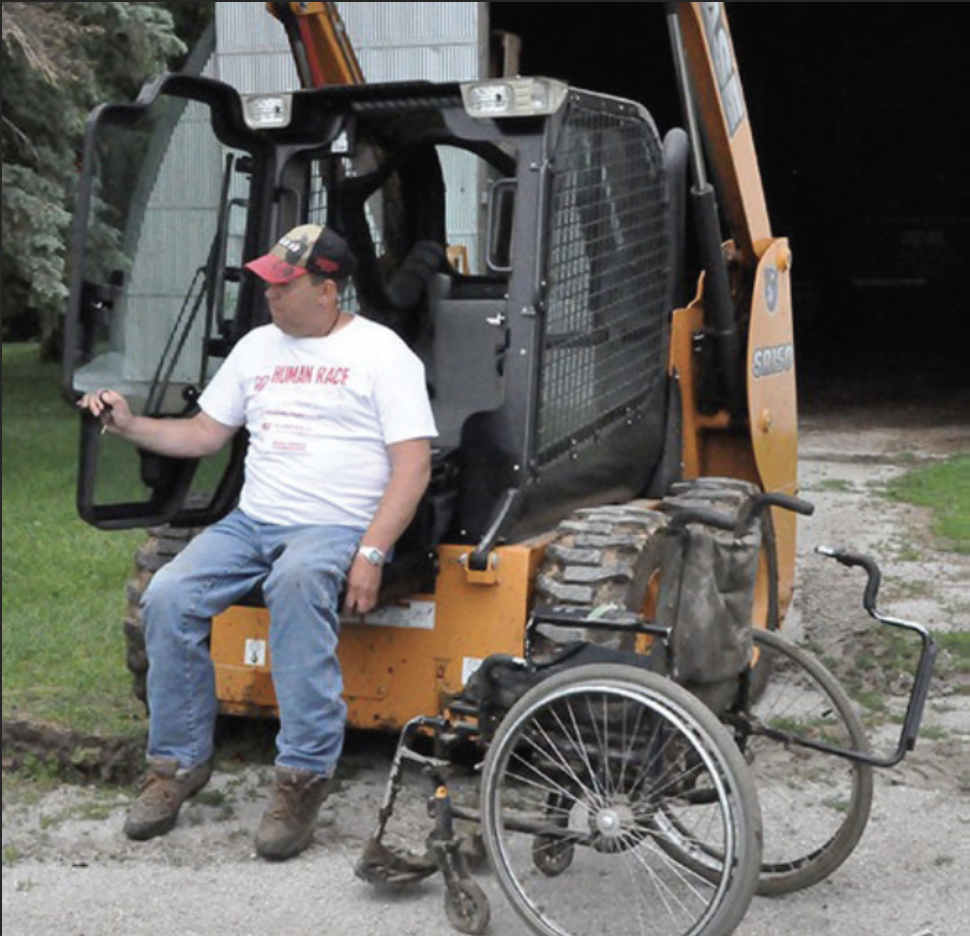Editor’s Note: This article contains mentions of physical injury and suicide.
For 30 years, AgrAbility has been dedicated to enhancing the quality of life for farmers nation-wide through physical, mental and economic adversity, former Wisconsin AgrAbility project Director and University of Wisconsin College of Agricultural and Life Sciences Senior Associate Dean Dick Straub said.
When a young Wisconsin beef farmer — with a wife and two kids under the age of seven — was injured in a farm accident, it became increasingly difficult to provide for his family and farm, Straub said. The farmer had become entangled in the head of a forage harvester causing him to lose an arm and sever his foot, which would eventually be reattached.
Most of the farming equipment the farmer needed to use, including the skid steer, required both arm function or leg function, which was impossible after the accident. Severe depression and feelings of worthlessness set in, Straub said.
The farmer eventually connected with AgrAbility, which partnered with a manufacturer to create a life-changing hybrid machine only requiring the farmer to use one arm and leg for the skid steer, said Straub.
AgrAbility has been supporting rural family farms like this for decades and changing people’s lives in the process, Straub said. Among the everyday difficulties of owning and operating a farm, there is a statewide decline in Wisconsin family farms, likely due to increasingly commercialized dairy and corporate farming that have taken over the agriculture industry. When Straub first began his time at UW, there were roughly 40,000 small dairy farms in Wisconsin. Today, there are a little over 5,000.
“I hope [AgrAbility] is keeping [family farms] alive because it’s keeping those farmers operational,” Straub said. “I think it’s important to keep … smaller farms here in Wisconsin. It’s what keeps our small communities growing.”
Programs like AgrAbility and UW’s Resilient Farms and Families are lifelines for family farms in this time of change for rural farming.
AgrAbility is one of the USDA’s longest-funded projects, which was authorized in the 1990 U.S. Farm Bill, beginning its first projects in 1991 and later partnering with Easter Seals, Straub said.
The Wisconsin faction of AgrAbility serves 25% of the total 13,600 nation-wide farmers, according to Straub. Support from AgrAbility consists of assessing roughly 20% farm injuries, 20% non-farm related injuries — caused by things such as sports, auto accidents or home related accidents — and 60% degenerative injuries associated with aging.
AgrAbility focuses on aiding farmers directly, but creating a support system for these farmers is an essential part of the process, Straub said. Straub has given numerous presentations to rural healthcare facilities and other rural occupations to ensure the surrounding community knows AgrAbility is a resource for farmers and families.
Support from AgrAbility is not limited to physical disabilities. As rural and farming communities begin embracing transparency about mental disabilities, they are seeking more resources, Straub said.
There is an uptick of farmers in Wisconsin who struggle with post-traumatic stress disorder, a mental disability AgrAbility is learning how to help manage in this industry.
“It turns out very often agriculture in itself can be somewhat therapeutic for those types of individuals,” Straub said. “It gives them something that they feel they can take ownership and get away from that mental distress they’ve been in.”
Conversely, farming can also cause stress on some farmers related to generational finances, environmental stressors and the huge maintenance responsibilities of a multifaceted farm.
Resilient Farmers and Families focuses on creating programs to help maintain positive mental health and healthy coping strategies for farmers, Resilient Farms and Families Farm Management Outreach Specialist Joy Kirkpatrick said.
“We as a nation are dependent on 2% of the population — farmers — and we know that farmers struggle,” Kirkpatrick said. “There are a lot of reasons that farmers struggle more.”
Financial stress, environmental risk to crop production and lack of resources and support in rural communities are all factors that contribute to farmers’ high stress levels, Kirkpatrick said. Suicide rates in the farming population, especially for men, are much higher likely due to these factors.
The Resilient Farms and Families initiative travels to rural communities educating people about the stress factors farmers face, Kirkpatrick said. The goal is to reach people who interact with farmers to create a supportive community for them.
“We want to surround the farmers with people who have those new skills or have new confidence in their skills [of managing stress],” Kirkpatrick said.
Mental Health First Aid is one of many programs Resilient Farms and Families offers, Kirkpatrick said. The program aims to help people feel more comfortable reaching out to someone they see struggling with mental health by destigmatizing the reality of mental crises.
Question, Persuade, Refer is a resource for those who see someone experiencing a mental health crisis, Kirkpatrick said. COMET is another initiative Resilient Farms and Families offers that works to change the mental and emotional trajectory of farmers’ wellbeing, outsourcing to ensure the farmer receives the treatment necessary to recover.
Mental and physical health support is vital to the survival of rural farming. Without it, the future of rural communities is at risk, Kirkpatrick said.
“If we don’t help — no farms, no food, right? It’s as simple as that,” Kirkpatrick said.
Kirkpatrick and others from the UW Extension Farm Management Department have complied other vital resources for farmers and families, which can be found here.


